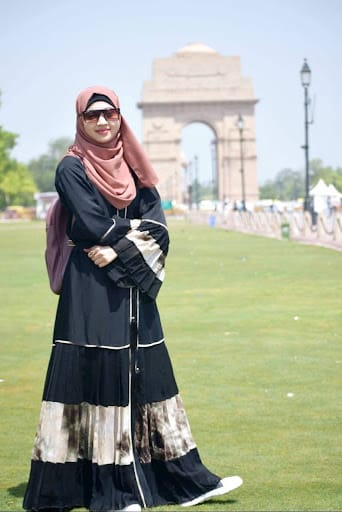This International Women's Day, I’m proud to spotlight Farhana Roshan, one of the amazing refugee scholars we support via the Duolingo University Access program! Through this partnership with the UNHCR, we help displaced scholars around the world navigate the university admission processes, so they can get the high-quality education they deserve.
Born in Bangladesh to a large Rohingya family, Farhana entered India as a child when her family fled from genocide. Once in India, she had to fight for her right to be educated, and soon became a child activist with Save The Children and UNHCR, advocating for other childrens’ and especially girls’ rights to attend school. She’s currently pursuing a BA in political science and law at the University of British Columbia, Vancouver, Canada. I asked Farhana about what inspires her, what motivates her, and what advice she has for women seeking education around the world.
LK: What inspired you to study political science and law?
FR: As a child, I dreamed of becoming an IPS (Indian Police Service) or IAS (Indian Administrative Service) officer. However, as a Rohingya refugee, I cannot access the UPSC (Union Public Service Commission) exams required for these positions. But I never gave up on dreaming big! During my research into different fields of study, I found political science to be fascinating, and relevant. It resonated with my passion for community work and my desire to make a difference.
I’m studying social justice to understand the opportunities which women are missing so that I can work accordingly for those who are not aware of their rights. I believe this world is incomplete without women’s contributions, but people ignore women, and deny them their rights, everywhere. If women and girls were free from these restrictions, this world would be more colorful.
LK: Has your time at university influenced your perspective on women’s issues?
FR: Before coming to university I thought being a “feminist” was not okay, but now I can say that I would love to be a feminist. Along with political science, I’m also studying social justice and law and society. Every day I’m learning something new about different types of social policies, and about systemic gender discrimination.
There is nothing women cannot do if they try. When I first saw the women of UBC going everywhere around campus and in Vancouver without any restrictions I felt like I was in another world, but now I can say that yes, we are equal, so we also deserve equal respect as men.
LK: Can you share a significant challenge you’ve faced as a woman in your educational journey, and how you overcame it?
FR: I was born a refugee, and I've had to migrate many times throughout my life. Because of that, I lost one year of my primary education when there were no opportunities for the Rohingya students without documentation. My parents were very upset, and they didn’t give up. They decided to migrate once more, to India, for our future. But there were also no opportunities for us in India until finally we got support from a person from Hyderabad and we started studying in a residential hostel. I learned there for five years, until my 10th grade graduation. Then, I was not allowed to write the national exam in 10th grade, but I did not give up. I tried everything I could and with the help of a new school principal and the UNHCR I was allowed to write the exam. I passed with good marks.
After that I was admitted to Intermediate and there was also the barrier when taking my 12th grade exams, but again with the help of my principal I wrote my final exams and passed with good marks. But for undergraduate studies there was no one to help change that policy for undocumented students. Because of that, I lost another year of studying. But I was lucky because at that time I got selected for the Duolingo Scholars program and now I’m fulfilling my dream in Canada!
LK: What are your plans after you earn your degree?
FR: By pursuing higher education, I hope to make a positive impact in my community and become an example for others. Studying abroad is a dream come true, and getting an education itself is my biggest dream. When I receive my degree, my entire family will benefit. As a girl I know I can play multiple roles and bring positive changes to our society. To educate a woman is equal to educating a whole family as well as the whole community. If a woman can be independent, she would make her sister, daughter and her whole family independent, too. Then they will do the same with others and the change would be sustainable.
LK: What’s your advice for other people considering pursuing higher education or advocating for women’s rights?
FR: My message is to be confident in yourself and your abilities. Remember that you are capable of achieving your dreams, and with determination and support, you can overcome any challenges that come your life. Never give up. There will be many situations in your life where you learn to accept that situation and then move forward. Everyone has the abilities to achieve the biggest things in their life and be independent. Fight for yourself.
Every woman deserves an education!
Farhana is living proof of the life-changing impact of education. She’s not just a survivor; she’s a trailblazer, showing us the way forward in championing women's rights through learning. Her story highlights why we must fight for every woman's right to education worldwide, and inspire us to keep pushing boundaries and working to ensure education is accessible for everyone, everywhere!
